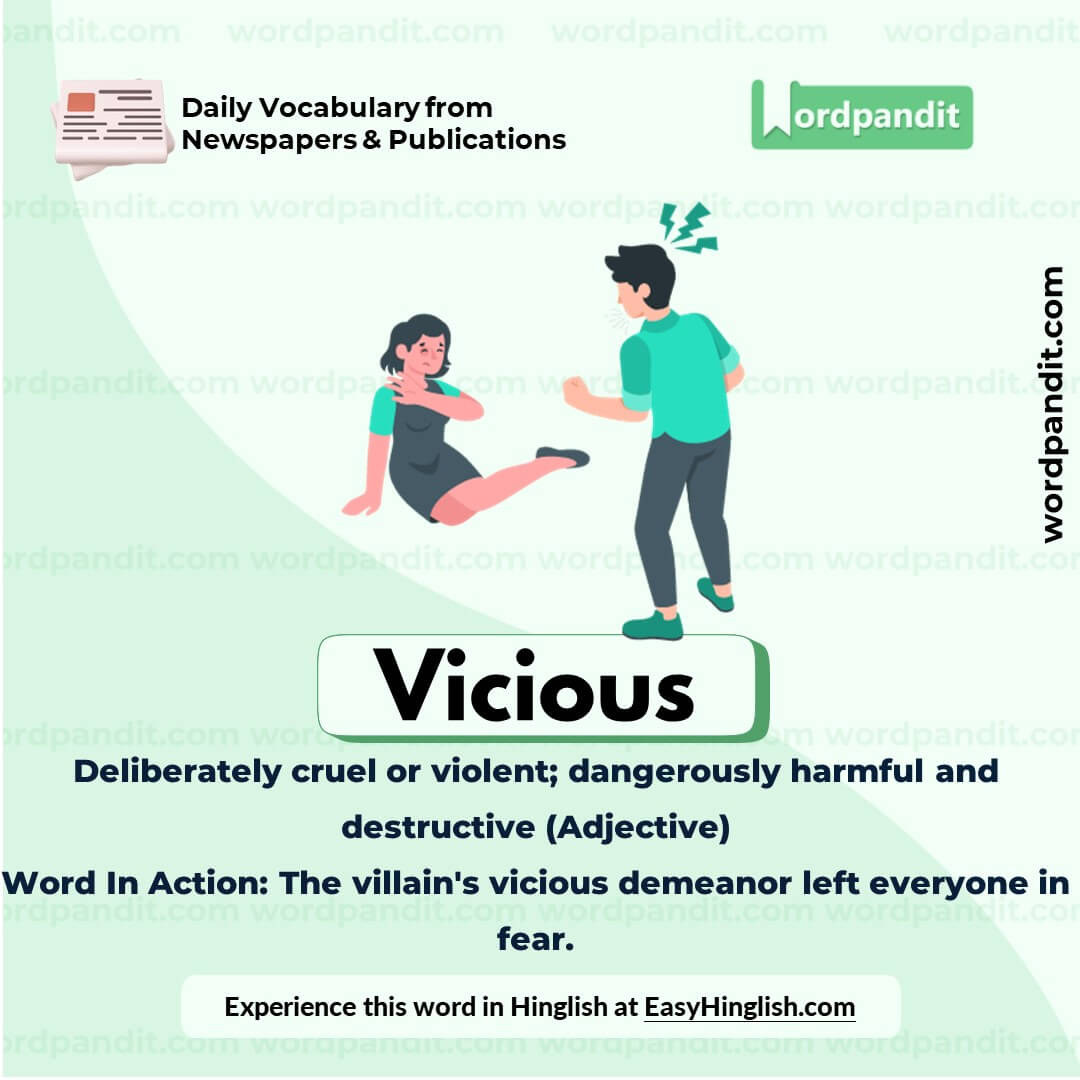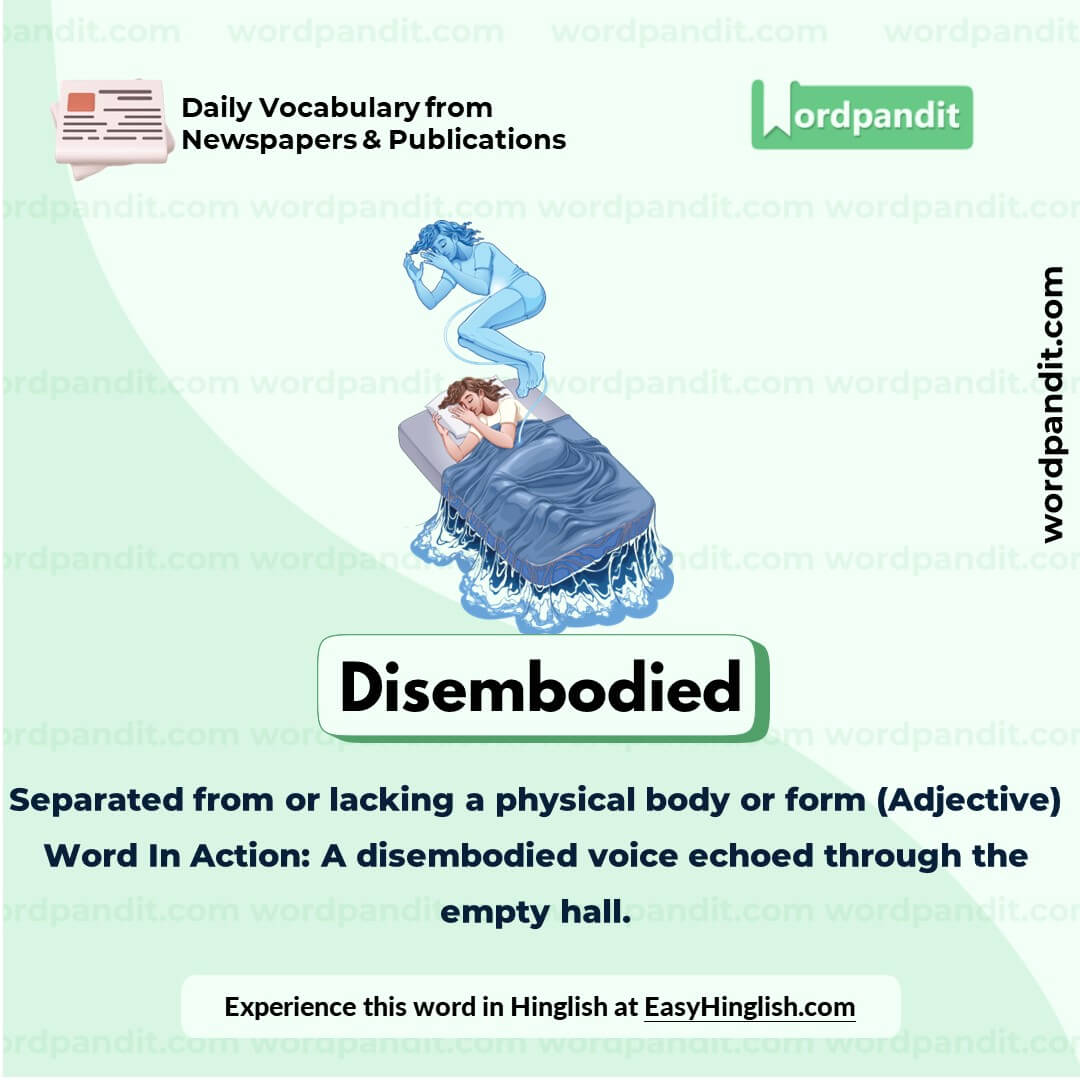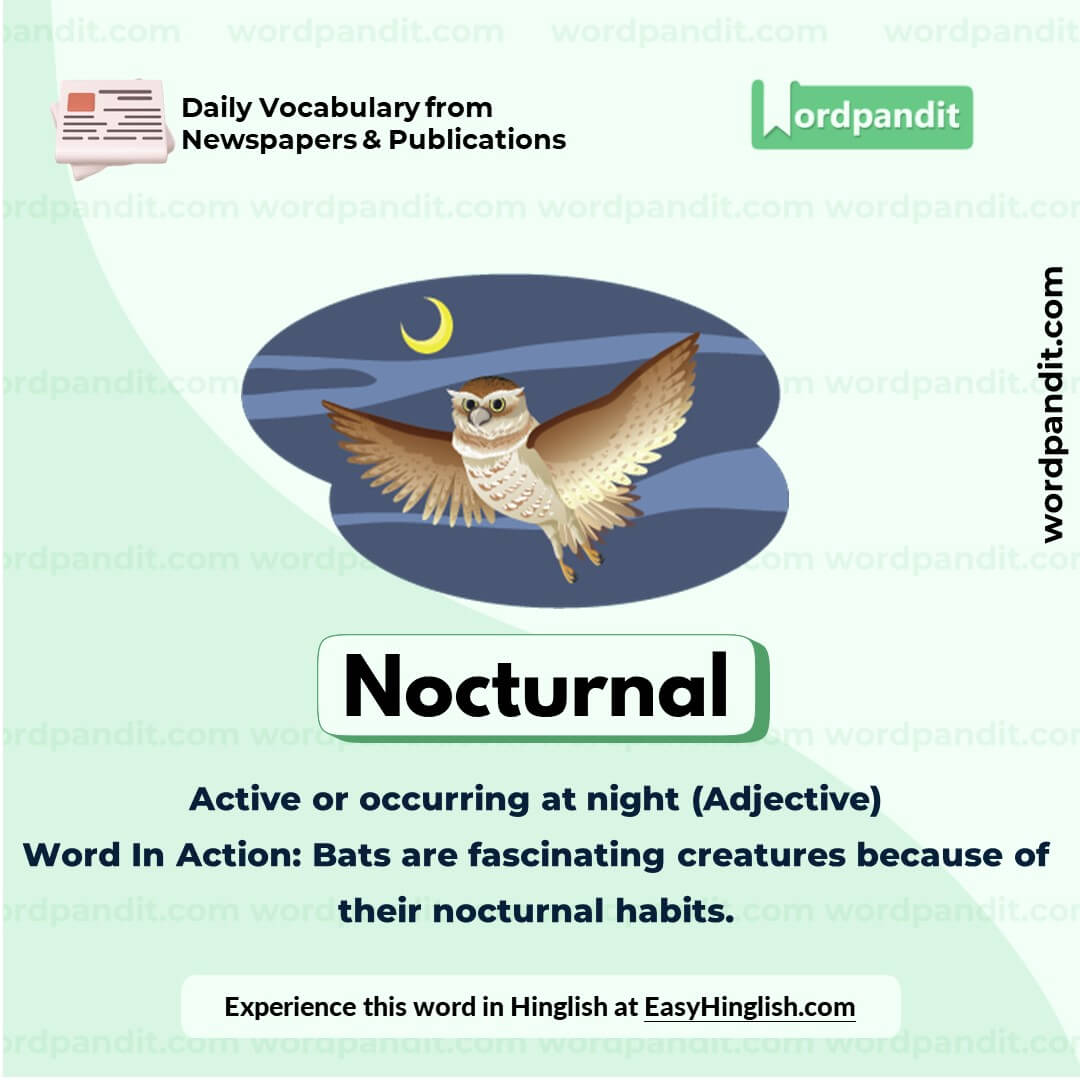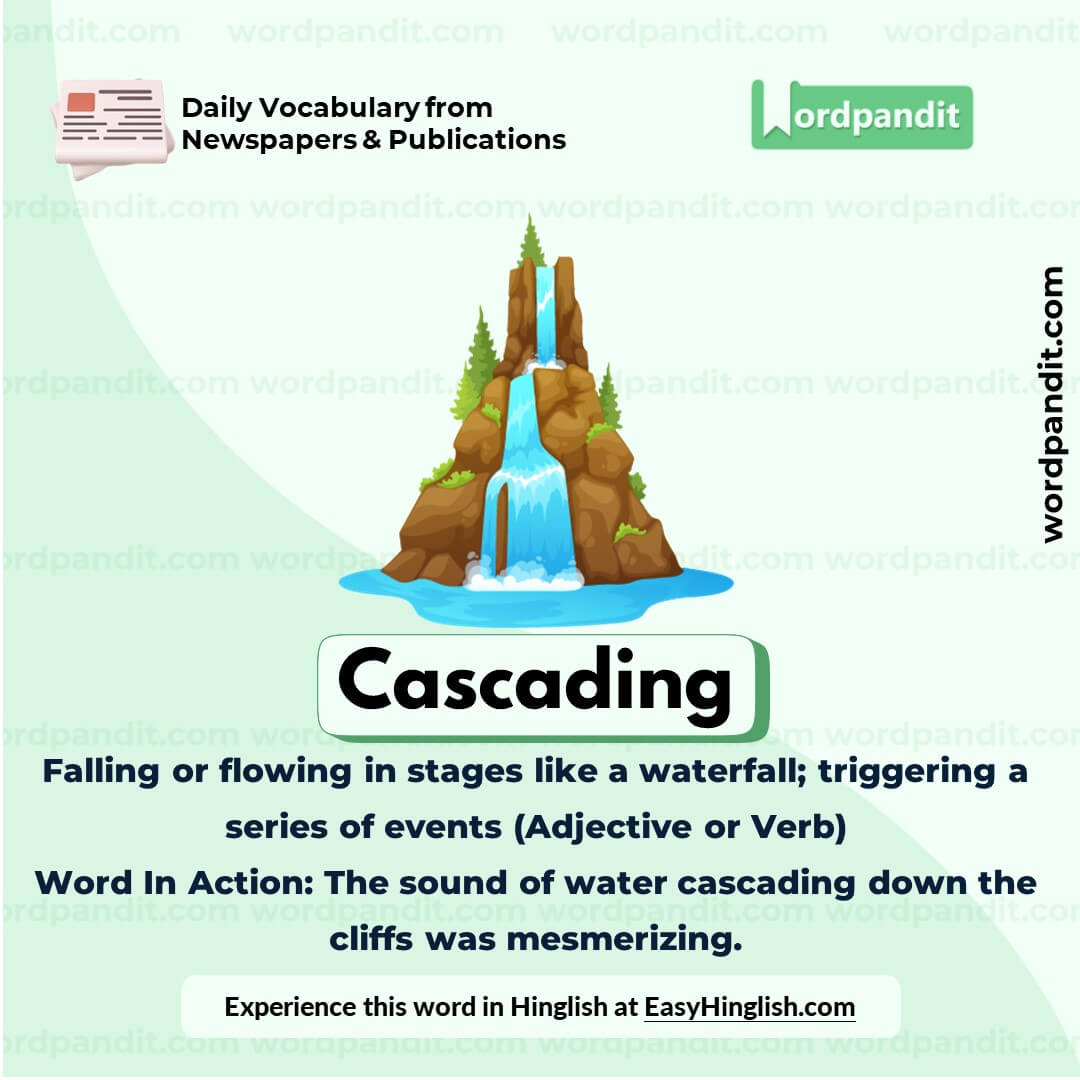Daily Vocabulary from Indian Newspapers and Publications
Welcome to Wordpandit’s Indian Vocabulary Hub
At Wordpandit, we understand the importance of staying rooted in the local context while expanding your language skills. This section focuses on enriching your vocabulary with words and phrases drawn from India’s leading newspapers and publications, ensuring you're learning vocabulary that is practical, relevant, and uniquely Indian.
Why Indian Sources Matter
We believe that the best way to master any language is by immersing yourself in local content. That’s why we carefully curate vocabulary from top Indian publications, including:
- The Hindu
- The Times of India
- The Economic Times
- Hindustan Times
- Live Mint
- The Indian Express
- And many others...
Stay Updated, Stay Relevant
With daily updates from Indian news sources, you’ll be consistently learning words that reflect the trends and shifts in Indian society and culture. Our focus is to provide vocabulary that enhances your understanding of the language in an Indian context.
How Wordpandit Supports Your Goals
Whether you’re preparing for exams, aiming to improve your professional communication, or simply want to stay connected with the latest Indian vocabulary, Wordpandit is here to guide you every step of the way.
Learn with a Practical Approach
Our interactive learning methodology includes real-world examples, engaging activities, and context-specific usage to ensure that every word becomes part of your active vocabulary.
Dive into Indian Vocabulary Today!
Why Choose Wordpandit?
Practical Learning: Focus on words you'll actually encounter in real-world reading, enhancing your comprehension and communication skills.
Diverse Content: From current affairs to scientific breakthroughs, our varied sources expose you to vocabulary across multiple domains.
Effortless Integration: Make Wordpandit a part of your daily routine. Just a few minutes each day can significantly boost your lexicon over time.
Your Path to Vocabulary Mastery
- Visit our Daily Vocabulary section regularly
- Explore new words and their usage in context
- Practice incorporating these words into your own writing and speech
- Track your progress as your vocabulary expands
Start Your Journey Today
Embark on your vocabulary enhancement journey with Wordpandit. By consistently engaging with our daily posts, you'll build a robust vocabulary that serves you well in academic, professional, and personal contexts.
Remember, a word a day keeps linguistic limitations at bay. Make Wordpandit your daily companion in the quest for vocabulary excellence!
WORD-1: Vicious
Context:
"This has a cascading effect on the heart, gut, hormones and other organs. Then it becomes a vicious cycle of sleep-deficit causing disease and disease causing sleep deficit." - The Indian Express
Explanatory Paragraph:
The word "vicious" describes something that is cruel, harmful, or dangerously destructive. It can refer to physical violence, harmful cycles, or behaviors that are intentionally malicious or damaging. In the context of the sentence, "vicious" refers to the harmful, self-perpetuating nature of the cycle between sleep deficits and disease.
Meaning: Deliberately cruel or violent; dangerously harmful and destructive (Adjective)
Pronunciation: VISH-uhs
Difficulty Level: ⭐⭐ Intermediate
Etymology: Derived from the Latin word "vitiosus," meaning "full of faults" or "corrupt."
Synonyms & Antonyms:
Synonyms: Cruel, ferocious, savage, malevolent, brutal
Antonyms: Kind, gentle, benevolent, mild, humane
Usage Examples:
- The lion launched a vicious attack on its prey, leaving no chance for escape.
- Rumors spread in a vicious manner, hurting the reputations of innocent people.
- Breaking out of a vicious cycle of poverty requires systemic changes and support.
- His vicious remarks during the debate stunned the audience into silence.
Cultural Reference:
"Vicious cycle" is a commonly used term in economics and healthcare to describe situations where a problem perpetuates itself, such as poverty leading to lack of education, which in turn leads back to poverty. This illustrates how the term is used metaphorically in various disciplines.
Think About It:
Can you think of a situation in your life or in society that can be described as a "vicious cycle"? How can such cycles be broken?
Quick Activity:
Identify two situations from current events where the term "vicious" could be applied. Write a short paragraph describing each.
Memory Tip:
Remember "vicious" by associating it with "vicious animals" like lions or wolves, which are often depicted as dangerously aggressive or harmful in stories.
Real-World Application:
The term "vicious" is often used to describe cycles, attacks, or criticism that are extremely harmful or negative. Understanding its meaning helps in describing intense negativity or harm in discussions about behavior, relationships, or systemic issues.
WORD-2: Disembodied
Context:
"It turned me into a zombie. I felt disembodied and scared,” he says. - The Indian Express
Explanatory Paragraph:
The word "disembodied" refers to something that is separated from a physical body or form, often used to describe a feeling of detachment from oneself or reality. It can also describe something lacking a clear physical or tangible presence. In the context, "disembodied" illustrates a sense of detachment, as though the speaker no longer felt connected to their physical self.
Meaning: Separated from or lacking a physical body or form (Adjective)
Pronunciation: dis-em-BOD-eed
Difficulty Level: ⭐⭐⭐ Advanced
Etymology: From the prefix "dis-" meaning "apart" and "embody," derived from Latin "in-" (into) + "corpus" (body), meaning "to put into a body."
Synonyms & Antonyms:
Synonyms: Detached, incorporeal, ghostly, intangible, spectral
Antonyms: Embodied, physical, tangible, concrete, corporeal
Usage Examples:
- The eerie sound of a disembodied voice echoed through the empty hallway.
- After the traumatic experience, she felt disembodied, as if she were observing her life from a distance.
- The character in the novel described his soul as a disembodied entity, wandering aimlessly.
- The futuristic movie featured a disembodied artificial intelligence that controlled the spaceship.
Cultural Reference:
The term "disembodied" is frequently used in literature and film to describe ghostly figures or spiritual beings. For example, in the classic play *Macbeth* by Shakespeare, the concept of disembodied spirits is explored through the appearance of apparitions.
Think About It:
Have you ever experienced a moment where you felt disconnected from reality or your surroundings? How would you describe that feeling?
Quick Activity:
Write a short paragraph imagining how a disembodied spirit might describe the physical world they can no longer interact with.
Memory Tip:
Think of "disembodied" as "dis" (apart) + "embodied" (in a body), meaning separated from a body. Visualize a floating ghost to make the connection.
Real-World Application:
The term "disembodied" is often used in psychology and medicine to describe feelings of detachment during stress or trauma. It's also applied in fiction to describe supernatural beings or voices that lack a physical presence.
WORD-3: Seldom
Context:
"There are many like him in the ‘vampire’ tribe who are battling sleeplessness, purely because of a habit of their own making, seldom because of an underlying health condition." - The Indian Express
Explanatory Paragraph:
The word "seldom" is used to indicate that something happens rarely or infrequently. It implies a low frequency of occurrence, often highlighting exceptions to a general pattern. In the given context, "seldom" is used to emphasize that sleeplessness in the described group is not often caused by health issues but rather by habits.
Meaning: Rarely or infrequently (Adverb); Rare or infrequent (Adjective)
Pronunciation: SEL-duhm
Difficulty Level: ⭐ Easy
Etymology: Originates from Old English "seldan," meaning "rarely" or "uncommon."
Synonyms & Antonyms:
Synonyms: Rarely, infrequently, hardly, occasionally
Antonyms: Often, frequently, regularly, usually
Usage Examples:
- He seldom visits the park anymore, preferring to stay indoors.
- Opportunities like this come seldom, so make the most of them when they arise.
- The old professor seldom raises his voice, making his rare stern remarks all the more impactful.
- In the digital age, handwritten letters are seldom exchanged.
Cultural Reference:
The phrase "Seldom seen" has been used as a title for songs and poems, often reflecting themes of rarity or longing. For instance, "The Seldom Scene" is a popular American bluegrass band, emphasizing the uniqueness of their musical contributions.
Think About It:
Why do you think some habits or behaviors occur seldom, even when they might bring positive outcomes? Reflect on this in the context of personal goals.
Quick Activity:
Write three sentences about your daily routine, using "seldom" to describe habits you rarely practice.
Memory Tip:
Remember "seldom" by associating it with "sell-dumb": Imagine a store selling something dumb that no one buys often.
Real-World Application:
"Seldom" is a useful word for academic writing, storytelling, and conversation to succinctly describe rare occurrences, making your language more precise and impactful.
WORD-4: Nocturnal
Context:
"Delhi’s Rishabh Chauhan, 27, would feel a workplace high even after two hours of sleep, till he felt cut off in his nocturnal island." - The Indian Express
Explanatory Paragraph:
"Nocturnal" refers to activities, habits, or creatures that are active during the night. It can also describe a lifestyle or condition related to the night. In the context provided, "nocturnal island" metaphorically represents the speaker's isolated state during nighttime, highlighting the disconnection from a typical daytime routine.
Meaning: Active or occurring at night (Adjective)
Pronunciation: nok-TUR-nuhl
Difficulty Level: ⭐⭐ Intermediate
Etymology: From Latin "nocturnus," meaning "of the night," derived from "nox," meaning "night."
Synonyms & Antonyms:
Synonyms: Nightly, nighttime, after-dark
Antonyms: Diurnal, daytime
Usage Examples:
- Owls are nocturnal birds, known for their exceptional vision in the dark.
- His nocturnal habits of staying up all night started affecting his health.
- The nocturnal serenity of the mountains was interrupted by the howling of wolves.
- She loved writing during nocturnal hours when the world around her was quiet.
Cultural Reference:
Nocturnal creatures, like bats and owls, have been popular symbols in literature and mythology, often representing mystery or wisdom. For instance, the owl in Greek mythology is associated with Athena, the goddess of wisdom.
Think About It:
Why do you think certain people or animals are naturally more active at night? Can this preference or adaptation be beneficial?
Quick Activity:
List five nocturnal animals and describe one unique adaptation that helps each thrive during the night.
Memory Tip:
Remember "nocturnal" by linking it to "nox," the Latin word for "night," and imagining creatures like owls that are active in the dark.
Real-World Application:
"Nocturnal" is used in biology to categorize animals and in everyday language to describe people who are more productive or active at night. Understanding this term helps in fields like zoology, medicine, and sociology.
WORD-5: Cascading
Context:
"This has a cascading effect on the heart, gut, hormones and other organs. Then it becomes a vicious cycle of sleep-deficit causing disease and disease causing sleep deficit." - The Indian Express
Explanatory Paragraph:
The word "cascading" refers to a process that flows or progresses in stages, often with one event triggering another in a series. In the context, "cascading effect" describes how an issue in one area (like sleep deficit) triggers problems in other areas (like the heart, gut, and hormones), creating a chain reaction.
Meaning: Falling or flowing in stages like a waterfall; triggering a series of events (Adjective or Verb)
Pronunciation: kas-KAY-ding
Difficulty Level: ⭐⭐ Intermediate
Etymology: Derived from the Latin word "cascare," meaning "to fall," and French "cascade," meaning "waterfall."
Synonyms & Antonyms:
Synonyms: Flowing, falling, streaming, successive, progressive
Antonyms: Stagnant, static, abrupt
Usage Examples:
- The heavy rainfall led to a cascading series of floods across the region.
- The failure of one component in the system caused a cascading effect, shutting down the entire operation.
- Her cascading hair glistened in the morning sunlight, creating a stunning effect.
- The presentation illustrated the cascading impact of pollution on marine ecosystems.
Cultural Reference:
In computing, "cascading" is a term used to describe processes like "cascading style sheets" (CSS), which determine the presentation of content on the web by applying styles hierarchically.
Think About It:
Can you think of a situation in your life or in nature where one small action caused a cascading series of events?
Quick Activity:
Draw a flowchart showing a cascading series of events, such as a decision leading to multiple outcomes. Label each step.
Memory Tip:
Imagine a waterfall cascading down a mountain to visualize how one event leads to another in a series, just like water flows in stages.
Real-World Application:
"Cascading" is commonly used to describe effects in various fields, such as environmental science, economics, and technology, to illustrate how interconnected systems influence one another in a sequence.
















